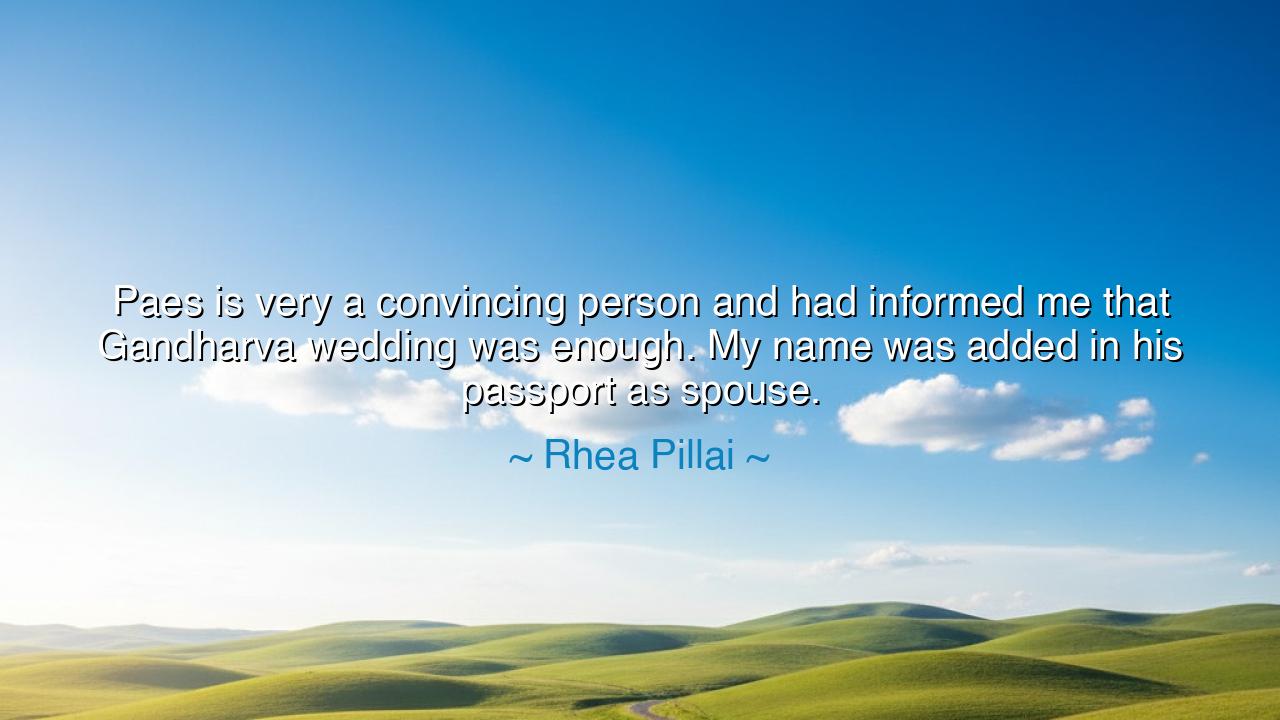
Paes is very a convincing person and had informed me that
Paes is very a convincing person and had informed me that Gandharva wedding was enough. My name was added in his passport as spouse.






Rhea Pillai, with words carrying both tenderness and regret, declared: “Paes is a very convincing person and had informed me that a Gandharva wedding was enough. My name was added in his passport as spouse.” In these lines lies the story of trust and persuasion, of sacred tradition invoked, and of the fragile boundary between ritual and law. A Gandharva wedding, known in the ancient scriptures of India, was a union of hearts without priest or witness, sanctified only by the consent and love of the two souls. To many it symbolized purity and freedom, yet in a modern world bound by documents and legality, it could leave one vulnerable.
The ancients held the Gandharva wedding in esteem. In the epics, such unions were seen as valid, celebrated in tales where kings and queens chose one another without elaborate ceremony. It was love itself that consecrated the bond. Yet as societies grew, layers of ritual and law were added, until what was once simple became entangled in expectation and rule. Pillai’s story echoes this tension — the clash between timeless tradition and the demands of the modern state.
History offers the tale of Shakuntala and King Dushyanta, whose union in the Mahabharata was a Gandharva wedding — chosen by love, without priest or witness. Yet when Dushyanta returned to his kingdom, doubt and law clouded their bond, leading to sorrow until truth was revealed. Rhea Pillai’s account feels like a reflection of that tale, where love and ritual were invoked, but the fragility of recognition left wounds that ceremony alone could not heal.
Her words also reveal the persuasive power of trust. To be told that this path was “enough” was to place faith in another’s conviction. The addition of her name as spouse in a passport gave the bond a sense of reality, yet symbols on paper cannot replace the deeper security of mutual responsibility. It is here that her story carries its lesson: that love and law must walk together, for without both, the union is vulnerable to fracture.
Let the generations remember: a wedding is both the joining of hearts and the anchoring of that bond in the world around us. Tradition alone may sanctify love, but when the world demands proof, it may falter without recognition. As Rhea Pillai’s story teaches, one must guard both the soul of love and its earthly foundation. For only when devotion and duty are bound together does marriage stand firm against time’s trials.






TMThai Tran Thao My
Rhea Pillai’s perspective here raises an interesting point about the varying perceptions of marriage. The Gandharva wedding concept brings in a more spiritual or personal element to the union, which may not align with traditional views. I wonder, how do other couples feel about this approach? Is it possible to have a meaningful, committed relationship without the societal expectations of a wedding, or does that lack of formality create challenges?
TNTham NguyenThi
The mention of a 'Gandharva wedding' in this quote is really thought-provoking. I’m curious about the idea that a relationship can be recognized in a non-traditional way, yet still be meaningful and valid. Do you think that society places too much emphasis on formal weddings, or can relationships exist just as deeply without all the legal and ceremonial trappings? It seems like Paes and Rhea found their own way of defining their connection.
AAn
It’s fascinating how Rhea Pillai talks about Paes and the concept of a Gandharva wedding. It sounds like there’s a deep trust and understanding between them, but I’m curious—what does it mean for her to have her name added to his passport as a spouse without the traditional ceremony? Could this highlight how personal relationships don’t always need the conventional markers of a wedding to be meaningful?
RRinne
This quote is really interesting because it brings up the idea of non-traditional marriages and how some people may see formal weddings differently. The concept of a 'Gandharva wedding' seems to suggest a more spiritual or symbolic connection, rather than a legally binding one. It makes me wonder, do you think that the formalities of a marriage, like a wedding or legal documentation, are really necessary for all couples, or can emotional bonds be enough?